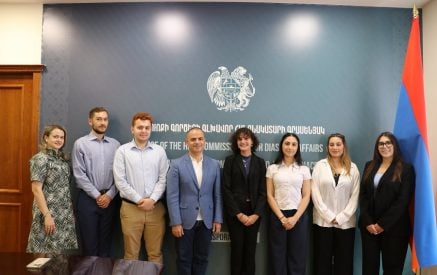The FINANCIAL — Despite the fact that Georgia is one of the safest countries in the world nowadays, experts have begun to predict an increase in crime rates in the near future. Theft, robbery and burglary are the crimes that Georgia will most likely face in the coming years, according to the latest Crime and Security Survey conducted by a group of Georgian and foreign researchers which was initiated by the Ministry of Justice and sponsored by the European Union.
“In 2012-2014 there will be a rise in the release of prisoners and this will lead to an increased crime rate,” believes Giorgi Glonti, Doctor of Law at Grigol Robakidze University in Tbilisi . “When a large group of prisoners gets out, it is almost certain that most will return to a life of crime as there will be virtually no employment opportunities for them. The statistic shows that about 60 percent of prisoners return to crime and only 40 percent begin a new life,” he added.
Nowadays, there are about 23,404 prisoners in the penal system in Georgia, which is 710 prisoners less compared to 2011.
Read also
However, according to recent data provided by the Ministry of Internal Affairs of Georgia, the total number of crimes reached 3,421 in 2011 which is 2.4 percent less than the previous year. Out of this number 860 crimes have been solved. The majority of crimes, 1,133 cases, are connected to stealing. Juvenile crime reached 333 cases.
1,590 cases of crime are registered in Tbilisi , the place where 1 172 7 thousand individuals live, comprising one fourth of the country’s total population (in total about 4 million people). “According to statistical data nearly half (45%) of all registered crimes in Georgia are committed in Tbilisi . Since 2007, the level of registered crimes decreased by 14,318 reported cases (49.1%), aggravated crime – 3,085 cases (42.9%). The most impressive is the decrease in more serious crimes: armed robbery (628 cases – 80.5%), robbery (880 cases – 74.3%); car theft (179 cases – 89.7%) and fraud (551 cases – 38.9%),” said Glonti.
Not the Russian-Georgian war in 2008, the upcoming parliamentary election in 2012, nor political or economic tensions, have influenced the crime level and tendencies in Georgia, experts say. The results of all three waves of the Crime and Security survey show a decrease in every statistical representation of crime level, stabilization and a drastic improvement of the crime situation.
“50 experts have studied 21 criminal cases in Georgia. Studies show that the victimisation level in the country is very low. Six crimes are committed per 100,000 people in Georgia while there are 42 in Germany, and 52 in Denmark. The crime rate in Georgia is approximately ten times less compared to other European countries. Theft is the most common crime in Georgia,” said Glonti.
In 2006-2010, a sharp decrease of registered crimes (from 62,283 to 32,261) was observed, meaning the crime level had decreased by 48.3 percent, according to the Crime and Security Survey Georgia, 2012.
The 2010-2012 CSS studies (21 crimes for the last 5 years) have shown that the level of multiple victimisation has significantly decreased from 891 to 479 units out of 3,000 interviewed persons (from 29.7% to 16.0%). During this period the victimisation level decreased by 13.7%. In 2011-2012 the level of victimisation stabilized from 16.8% to 16.0%.
The victimisation level for Georgia is 5%, which is 9 times lower than the 30 European countries included (45.5%) and almost 11 times lower than Estonia (58.4%). The number of respondents victimised by crimes against an individual or HH (12 crimes in total) has decreased on average, from 28.6% to 18.5%. “For example, the number of car theft victims has decreased from 12 to 5 cases (1.1% – 0.1%) and is now stable. Victimised by crimes against an individual (9 crimes in total) has decreased on average, from 7.3% to 3.3%, (by 4%). For example, theft from and out of a car has decreased from 63 to 27 cases (from 2.1% to 0.9%) and is now stable,” said Glonti.
The vast majority of respondents were “not worried at all” about being physically attacked by strangers over the last 12 months (in 2010 – 74.2%, in 2012 – 76.1%), as well as for friends and relatives being physically attacked (in 2010 – 68.9%, in 2012 – 74.8%), or being burgled (in 2010 – 64.4%, in 2012 – 74.7%). According to the data from 2012, only 1.6% was worried about being physically attacked, 2.4% about their family members or friends being physically attacked, and 2.6% about being burgled.
Mostly people are confident about their safety during the morning and night hours in Georgia. Compared to the 2010 data, the feeling of safety at night is higher in 2012; in 2010, 63.9% always felt safe, and in 2012 – 81.6%.
The number of respondents who believe that their neighbours would always help them if needed has increased from 57.4% to 74%.
According to the surveys in 2010-2012, 85% of respondents who had called the police in 2010, and 87% in 2012, declared that the police arrived in time.
People generally think that their children are safe at schools as well. In the 2012 survey, 62% said that children are “absolutely protected”, 30% consider their children to be “fairly protected”, 3% said “fairly unprotected”, and 1% answered “absolutely unprotected.” In 2010, only 16%, four times less than in 2012, had assessed children as “absolutely protected”; 21% as “fairly protected”; and 6%, six times more than in 2012, as “absolutely unprotected”. The introduction of mandatory service at schools has likely influenced these response rates.
Females are more often victimised, and this trend is especially sharp in data obtained by the survey conducted in 2012. According to the last survey, out of 479 cases, 314 victims were females; males fell victim in only 165 cases. It turns out that females are victimized twice as often as males. The relationship was different in the survey of 2011; females were involved in 285 victimisation cases, and males in 218 cases.
According to the victimisation survey in 2004 in Europe (based on 10 crimes), the average level of victimisation was 15.8%, whereas in the cities of those countries the average was 21.7%. Generally the victimisation levels in cities of developing countries are higher when compared with developed nations.
According to the Ministry of Internal Affairs of Georgia in total 529 foreign citizens became victims of crime in 2011. Crime was committed by 353 foreign citizens in 2011. The top five countries by number of offenders are: Turkey, Armenia, Russia, Bangladesh and Iran.























































